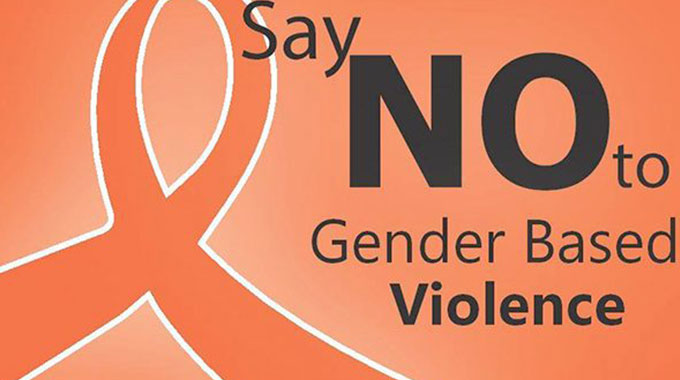COMMENT: Eradicating gender-based violence is everyone’s duty

AS Zimbabwe yesterday joined the rest of the world in the 2021 commemoration of the 16 Days of Activism Against Gender-Based Violence Campaign, the nation is reminded that it is everyone’s duty to eradicate the abuse of women.
The campaign, being held under the theme, “Orange the World: End violence against women now!” will run until December 10.
According to the latest estimates, says the UN, nearly one in three women aged 15 years and older, around the world have been subjected to physical or sexual violence by an intimate partner, non-partner or both, at least once in their lifetime, indicating that levels of VAWG have remained largely unchanged over the last decade.
“These numbers do not reflect the impact of the Covid-19 pandemic and would be even higher if they included the full continuum of violence that affect women and girls including sexual harassment, violence in digital contexts, harmful practices and sexual exploitation,” says the UN.
In keeping up with this year’s theme, the Parliament of Zimbabwe was on Wednesday night lit orange in an initiative that involved various partners.
The national launch of the campaign was held in Epworth, Harare yesterday coinciding with the launch of the Epworth Safe Market as well as the Epworth One Stop Centre for survivors of Gender Based Violence.
Speaking on the eve of the campaign Deputy Minister of Women’s Affairs, Community, Small and Medium Enterprises Development Jennifer Mhlanga the Covid-19 pandemic has resulted in a global increase in reported cases of gender-based violence including Zimbabwe.
“The ZRP Victim Friendly Unit recorded 4 153 Domestic Violence cases between April and June this year. In the same period 1 289 rape cases were recorded and of these, 45 cases were perpetrated on people with disabilities for the disabled.
The vulnerabilities faced by women, and girls living with disability can never be emphasised. It is like a double-edged sword to the heart. One Stop Centres administered by the Ministry recorded a total of 349 physical violence cases, 413 psychological violence, 874 sexual violence and 502 reported economic abuse.
“These were at the peak of the Covid-19 pandemic, but even before the crisis, Zimbabwe Republic Police statistics painted a grim picture of the prevalence of violence against women and girls in the country emerging data and reports from actors on the front line indicate that GBV is on the rise particularly child marriages” she said.
Acting UN Resident Coordinator Dr Alex Gasasira commended both Government and the UN for embracing the goal to mitigate violence against women.
“Despite the challenges, it is also important to acknowledge successes. We take heart in the recent initiative by Government of Zimbabwe, the European Union Delegation and the United Nations in launching the High-Level Political Compact (HLPC) on Ending Gender-based Violence and Harmful Practices in Zimbabwe. This important milestone was achieved in late October through the Spotlight Initiative,” he said.
In a statement, SADC executive secretary Mr Elias Mpedi Magosi bemoaned the lack of consistent and sustained GBV prevention programmes and lack of reliable, timely and accessible data on GBV to inform targeted GBV programmes in the Region.
“This year’s theme for the Campaign, Orange the World: End violence against women now! calls for immediate action to end violence against women and girls. In line with the theme, I welcome the campaign by the United Nations Secretary-General, titled UNiTE by 2030 to End Violence against Women, calling for global action to prevent and eliminate violence against women and girls,” said Mr Magosi.
“Efforts to prevent and eliminate violence against women and girls have been, and continue to be pivotal to the SADC regional integration and development agenda by addressing gender-based violence. This year’s theme complements SADC’s on-going efforts and commitment expressed in the SADC Protocol on Gender and Development that calls for the development of strategies to prevent and eliminate all harmful social and cultural practices.”
He also called for coordinated efforts involving all stakeholders including government, civil society organisations, traditional leaders, researchers, development partners, the media and the private sector to deal with gender-based violence.
“It is such a coherent, multi-disciplinary, multi-level and a multi-sectoral approach that will yield greater impact, sustainable prevention of GBV, and bring about transformational change that we all aspire for,” he said.
“Let us work together to create a GBV free and safe SADC region, remembering that any progress in a society is measured by how its women and girls are treated. There cannot be any meaningful social progress and development if GBV is allowed to thrive in our society.”











Comments